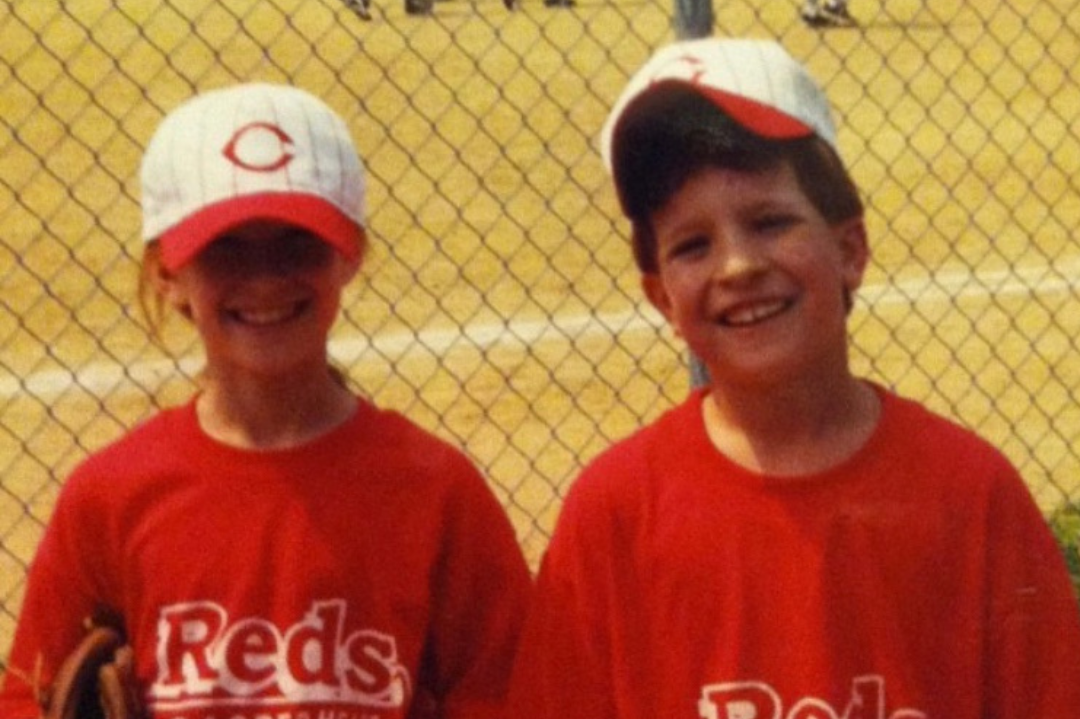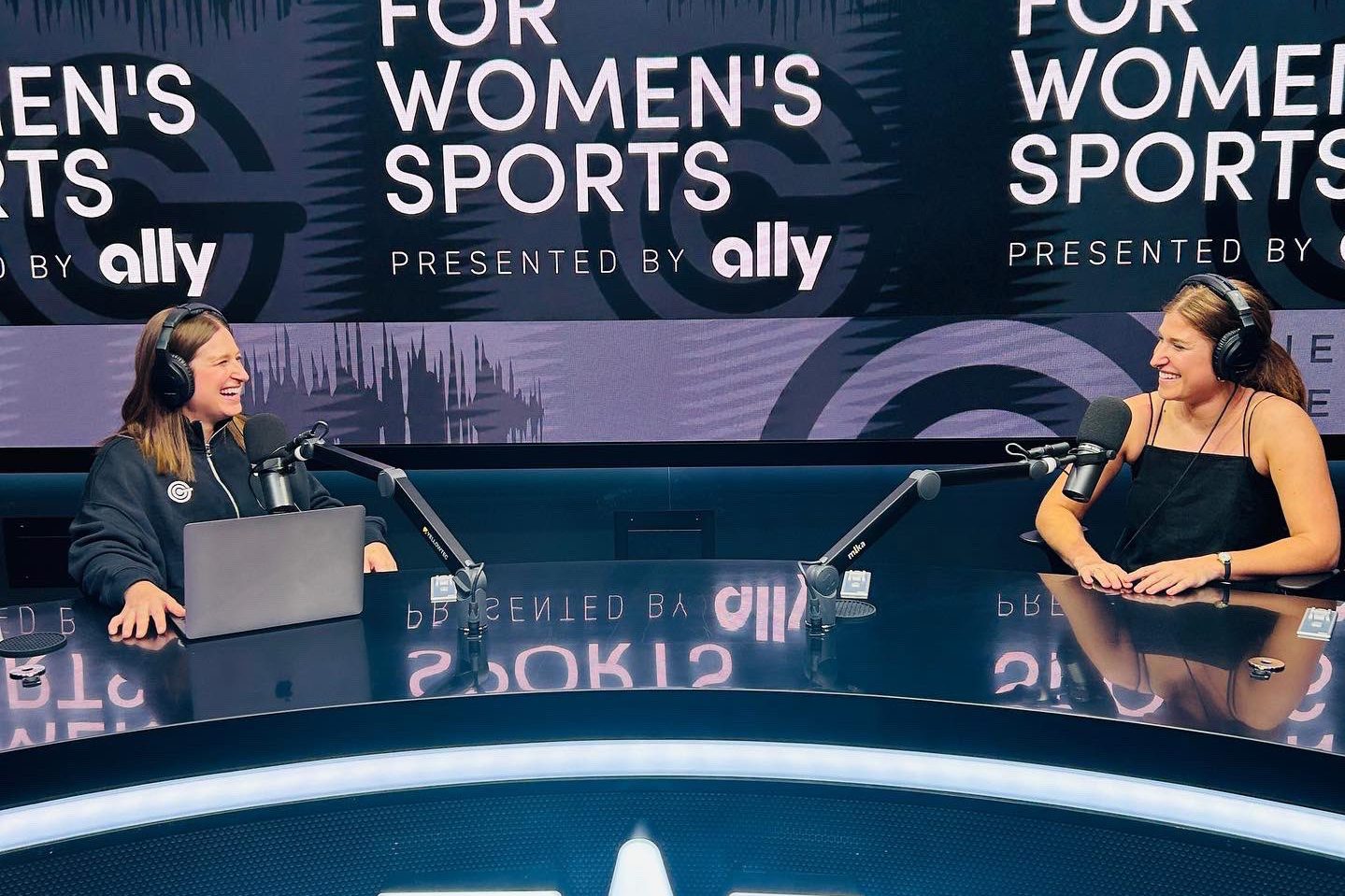
Before she became the founder and Chief Executive Officer of GOALS, a consultancy and media company dedicated to growing the business side of women’s sports, Caroline Fitzgerald was a seven-year-old girl ready to lace up her cleats, step onto the diamond, and play competitive baseball.
“I’m one of eight kids, so playing outside and playing sports is something that we just did all the time growing up,” said Ms. Fitzgerald. “When my younger brother, Tanner, and I were finally old enough to play on an official team, we were excited and since there were no all-girls baseball teams at the time, my parents signed me up to play on the same team as him. We showed up for our first game and almost immediately the other team started teasing us. It was all little kid stuff like ‘girls can’t play baseball’ and ‘we’re going to crush your team.’ I took that very personally.”
Determined to prove the boys wrong, Ms. Fitzgerald lifted her chin, rolled her shoulders back, grabbed her glove, and ran out onto the field with her teammates.
“I took my position in the infield, and it just so happened that the first three boys on the other team all hit ground balls right to me. I threw them all out,” said Ms. Fitzgerald. “That was an important moment for me. I remember walking off the field with this feeling of empowerment and this knowledge that I was never going to let anybody tell me that I couldn’t do something or couldn’t be good at something because I was a girl.”

She might have only been seven years old, but walking off the field that day, Ms. Fitzgerald could see her future already starting to take shape.
“From a very young age, I knew I wanted to do something eventually at the intersection of sports and business and women’s empowerment,” said Ms. Fitzgerald. “I always had the idea of combining those three things planted in the back of my head as I looked at my personal interests plus my academic and professional skills set. My career path was kind of a winding road journey, but I always had that North star idea in mind.”
Ms. Fitzgerald’s idea became a reality during the Coronavirus pandemic in 2020, when professional women’s sports became more accessible to fans than ever before.
“For the first time in history, you could sit down and watch a complete WNBA (Women’s National Basketball Association) season or a complete NWSL (National Women’s Soccer League) season on TV. I was one of those people who sat down during the pandemic and started watching and when I did, I started noticing business results were off the charts. Viewership was up, sponsorship sales were up, merchandise sales were up,” said Ms. Fitzgerald. “My interest was piqued, and I wanted to learn more about not only the business results, but also why there were so many gender gaps that still exist in professional sports.”
Looking for the answers to her questions, Ms. Fitzgerald’s searched for a podcast that discussed these new topics of interest, but she couldn’t find one. Her solution? To start one.
“I started the company GOALS by first starting the podcast, The Business Case for Women’s Sports. On each episode, I invited people on the podcast who could talk about the things that I wanted to learn about,” said Ms. Fitzgerald. “After a year of podcasting and putting out content on our social media channels, I had the idea to take the work I was already doing and combine it with my marketing and sponsorship background to create the full business. I saw the women’s sports industry was being underserved and thought maybe I could lend a hand.”

Today, GOALS continues to show brands, networks, and investors why it is good business to invest in women’s sports. Since 2020, GOALS has worked with multiple sports organizations to help with their growth, including the Women’s National Football Conference, Baseball for All, multiple professional women’s hockey teams, the USA Rugby Women’s Premier League, and more.
To learn more about her experience as a young female athlete and her journey in the sports industry, Little League sat down for a special #GWG50 Six-Innings Conversation with Ms. Fitzgerald:
First Inning: What was the best advice that you received as a young female athlete that you have carried into your professional career?
My family instilled in me to always work hard and to always show up. That’s not groundbreaking advice since, you know, a lot of people hear that advice, but it’s true. If you keep showing up and you keep working hard, usually good things happen in sports and in life. That work hard and show up mindset is what I carried with me while playing baseball and basketball, and it is something that I have carried with me into my professional career.
Second Inning: What roles do youth sports and youth sports organizations play in the growth of professional women’s sports?
We have learned a lot over the past 10 years about the impact sports have on young females and reports are coming out showing a direct connection between girls playing sports and women having leadership skills. So, when I think about the role of youth sports, I think about it on a more macro scale of how essential it is to give girls opportunities to play sports at the youth level, because that means, based on the data, that we are going to have more women leaders in our society once they grow up… I think if we can get more girls playing sports, then we are going to have a more equitable society and then girls are going to see more opportunities in every single facet of life. Youth organizations play a huge role when it comes to the growth of women’s sports in general, but I would say even more so in women’s empowerment.
Third Inning: A phrase that has been prominent this year as we celebrate Girls with Game 50 is ‘if you can see her, you can be her.’ Who did you look up to when you were a young female athlete?
The other night, I got to serve on a panel discussion talking about women’s sports and I sat next to the person that I always looked up to as a kid, Suzie McConnell-Serio, and it was a real pinch me moment. Susie was an incredible basketball player and basketball coach. She is from my hometown, and I always looked up to her. I wanted to be a point guard like her and play for her because she coached at my high school, but she left to go coach in the WNBA before I got there. She is someone that I always looked up to because I loved the way she played. She was tough, scrappy, hardworking. Everything that I was taught to be growing up as a young athlete and as an individual is what I also saw in her. It was just so full circle to sit there and talk about women’s sports and share that moment with her.
Fourth Inning: What would your elevator pitch be to an individual or to an organization on why they should invest in women’s sports, whether it be in youth, collegiate, or professional sports?
What I think is special about the opportunity of investing in women’s sports is that doing what is right lives right alongside doing what is profitable. It is this classic win-win and there are two really good things that come from it. The first is that it is going to be good for their bottom line. It’s going to be good for business. There’s a report out of Australia that says that for every $1 spent on a sponsorship in professional women’s sports, you’re going to see a $7.29 return on that investment, which is a pretty good return if you ask me. Number two is that it’s good for society. It’s the right thing to do. So, by doing something that’s good for your business, you’re also going to be doing something that’s good for the greater society. It’s going to be good for everybody. So, I just don’t think there’s any downside.
Fifth Inning: With your experience in the industry, what advice would you give to a young female professional who is looking to establish themselves in a career in sports?
I’ll offer two pieces of advice. Number one – keep showing up, every single day. I especially give this advice to people that are working in women’s sports because it can be a tough industry that is under resourced and is not yet seeing that big increase of investment that it needs. When it comes to working in that industry, it can be challenging. You’re trying to do more with less, which is never easy. You’re just grinding all the time to drive results. You have to keep showing up. Things are changing and getting better every single day for the industry, so you have to keep going and keep pushing.
The second piece of advice is a Dolly Parton quote that I really like. The quote is, “find out who you are and do it on purpose.” I challenge everybody to think about what your passion points are, what your purpose might be, and then think about how that relates with your skill set. Once you figure out who you are and how those things intersect, go forward and put intentionality behind it and amazing things can come from that. There might always be the clearest path to get to your end goal, but if you keep showing up, if you keep working hard, those things will become clear.
Sixth Inning: Little League is celebrating 50 years of female involvement in the program this year. While we celebrate the past, what do you think is the future for females in sports, whether it is on the field or behind the scenes?
For a long time, the sports world has been built by men, for men. I think the future of sports will be a much more inclusive place, especially for women and girls.

NOTE: To read more of the Special “Six Inning” Features as part of the Little League Girls with Game 50 Celebration, visit LittleLeague.org/GWG50. The #GWG50 celebration is proudly supported by DICK’S Sporting Goods, a long-time Little League partner that is committing to creating opportunities for girls and women in sports and will be activating for this celebration around key events and milestones this year.